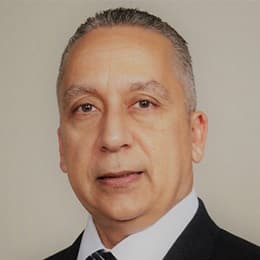Academic Spotlight: Dr. Hector Garcia, Associate Dean

From a young age, Dr. Hector Garcia knew he wanted to teach and to serve others. After nearly three decades working in law enforcement and two decades in education, he has done just that.
Having earned his bachelor's and master's degrees in criminal justice, Garcia now serves as an associate dean at Southern New Hampshire University (SNHU). Beyond his criminal justice degrees, he also earned his MBA from SNHU and his Doctor of Education in Organizational Leadership.
Garcia recently shared why he chose criminal justice, how he stays connected with his students and more.
Can you tell us about your professional background?
I served for over 30 years in law enforcement and public safety, working in a variety of specializations (investigations, juvenile, narcotics, training, communications and administration). Concurrently and post my law enforcement career, I have been involved in higher education as a dean of criminal justice and environmental sciences and have served as the director of the police and fire academies, corrections academy, private security certifications and a professional public safety assessment center.
I have been teaching online for nearly 20 years and have mentored hundreds of students and professionals over the years. I served with the U.S. Department of State in various deployments in Africa, Central America and the Caribbean to further the democratic rule of law in partner nations. I have also lived and worked in the United Arab Emirates, conducting leadership training to national and emirate police departments.
What first drew you to higher education?
Ever since I was a youngster, I had two professional goals: to teach and to serve in public safety. I was drawn to serving and guiding others as I had so many great mentors who helped me achieve my goals along the way. I found this to be a noble cause and one that I would like to repay and to help mold the future. I felt that a positive way to accomplish this was to be in the higher education field.
So, I started off with being an instructor where I could make a difference in my students’ lives. Later, as an administrator in higher education, I could extend my reach through program developments and refinements along with guiding and mentoring faculty and students, my mission and reach could be magnified.
What aspects of your own education have been influential in shaping your career in academia?
I believe that the practical application of theories and how they manifest and materialize into real-world applications has been very influential in shaping my academic career. Having the knowledge and theories behind certain phenomenon, along with how they manifest, is critical to the development of learning materials that mimic real life. There must be a level of realism in student studies to help prepare them for the actual work environment and my education was a testament to that premise.
What attracted you to this field of study? What keeps you excited about it?
I was attracted to criminology as I often pondered what could cause a person to commit such crimes against humanity. What could be the driving forces that pushed them into a world of crime and deviancy? A sense of curiosity to discover the root causes of crime and evil was only a stepping stone in my journey. For this study is reactive, crimes have already been committed and people have been victimized.
Building off that knowledge, I wished to be able to make a small impact on potentially preventing crime and victimization in some way. This keeps me excited about how we can take one small step or action that could possibly help steer a person who may be taking a wrong turn and help push them towards a better place.

How have you found ways to effectively connect with students?
I have been very fortunate to place myself in positions where I can directly impact students. I have developed three social sciences webinar series, where students actively participate in the development and delivery of the webinars. Here I work with students from all disciplines as I expose them to real-world leadership situations that help develop their critical thinking skills, teamwork, digital fluency and problem-solving skills.
In addition, I have served as the faculty advisor for numerous student clubs (Psychology Club, Frontline Heroes Club, Law & Disorder Club and the Social Sciences Minority Group) where I can again help guide and mentor students.
I have also been fortunate to have personally mentored over 40 students here at SNHU, where I have provided advice, guidance and knowledge to help them achieve their goals. My mentees and proteges have experienced great success with being admitted to law schools, being hired by the FBI, interning at The White House, being first-gen graduates and being awarded nearly half of the SNHU GC Penmen Student Awards over the last three years.
What brings you the greatest joy in your work at SNHU?
My pride and joy is the success of my students as they overcome self-doubts, life challenges and other obstacles to succeeding with their educational and professional goals. Instilling not only book knowledge, but workplace experience in their studies has truly helped propel them past their goals. After all, it is their success that is the truest measure of our collective success.
What do you feel is unique about the faculty and students you work with?
Here at SNHU, by and large, our faculty and students are our family. In spite of being such a large university, faculty and students have direct access to me and I always have time for them. What could be more important in an educational institution than making time for our students and faculty? We are unique because we treat each other with respect and we truly care about each other!
What does SNHU’s mission to transform the lives of learners mean to you?
SNHU's mission to transform lives means the world to me as it was my mission when I decided as a young person to serve and protect. This is my opportunity to help guide someone towards their goals which can have exponential effects on them and their families and beyond. Think about it, how many people can say that they truly can change and impact the world, one person at time? We can!
Outside of work, what’s something you’re passionate about or really enjoy doing?
Outside of work, I truly enjoy spending quality time with family and friends. We love to travel and visit new places to learn about people and how they live, their history and traditions and their culture. There is a big world out there with many wonderful people and marvels to see that are just waiting for us to get to know them. These experiences and our education is something that can never be taken away from us and we need to explore them!
A degree can change your life. Choose your program from 200+ SNHU degrees that can take you where you want to go.
Alexa Gustavsen ’21 is a content marketing specialist and writer at Southern New Hampshire University. Based in New Hampshire, she completed her bachelor's in creative writing and English on campus at SNHU. Currently, she is pursuing her master's in marketing online at the university. Connect with her on LinkedIn.
Explore more content like this article

Academic Spotlight: Dr. Laman Tasch, Associate Dean of Academic Strategy, Social Sciences

Why Earning His BA in Political Science Mattered to Anthony Fernandez

What Can You Do With a Master’s in Criminal Justice?
About Southern New Hampshire University

SNHU is a nonprofit, accredited university with a mission to make high-quality education more accessible and affordable for everyone.
Founded in 1932, and online since 1995, we’ve helped countless students reach their goals with flexible, career-focused programs. Our 300-acre campus in Manchester, NH is home to over 3,000 students, and we serve over 135,000 students online. Visit our about SNHU page to learn more about our mission, accreditations, leadership team, national recognitions and awards.


